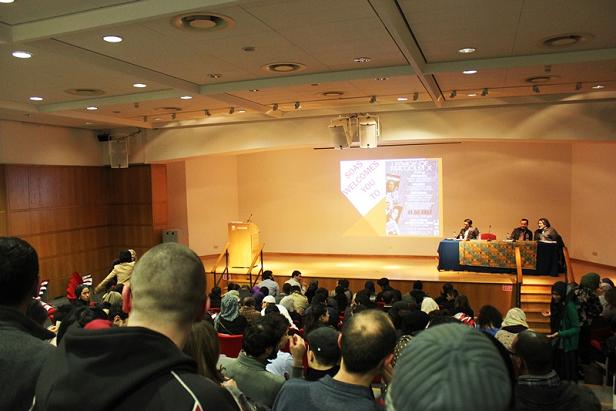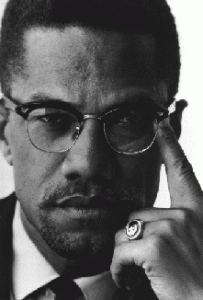Malcom X: between theory and the riots Comment
Ideas, New in Ceasefire - Posted on Sunday, February 26, 2012 21:27 - 1 Comment
By Jonny Benett and Adam Elliott-Cooper

Paul Gilroy and Tariq Ramadan discuss the Legacy of Malcolm X, at SOAS, 21 Feb 2012 (Photo: Usayd Younis/Ceasefire)
‘The Legacy of Malcolm X’, an event organised by students at the School of Oriental and African Studies, University of London, on the 47th anniversary of Malcolm’s assassination was a full-house affair. Over 600 people jostled for every seat, many ending up perched on steps and huddled against walls. The lecture was also streamed live to the Malcolm X and Dr. Betty Shabazz Memorial and Educational Center in New York – in recognition from all of the importance of the occasion.
The anticipation was palpable. The chair, Zead Ramadan of the Center, presented the two speakers, Paul Gilroy, LSE professor and author of the seminal ‘There Ain’t No Black in the Union Jack’ (as well as the introduction to the Autobiography of Malcolm X), and Tariq Ramadan, Professor of Islamic Studies at Oxford University.
Of course, Malcom’s life, his message and his evolution mean so many different things to so many different people. However, the overriding point that kept being made during the evening was that, at its core, Malcolm’s legacy is one of love: love for humanity, for justice, for freedom, to demand that the world not be allowed to continue along the path that it has. Malcolm’s love was love in the radical sense.
As articulated by Tariq Ramadan, there needs to be a reassessment of the term ‘radical’ in this instance. In Malcolm’s case, his message was indeed radical, and exceptionally so for the period. Ramadam was careful in distancing himself from the post-9/11 language that often frames radicalism through the politics of hatred and indiscriminate violence – Malcolm’s radicalism was, to the contrary, an articulation of the link between the suffering of African Americans with that of the struggles against imperialism in the Arab world, the subordination of the African continent and wider forms of oppression. In this sense, it was Malcolm’s insistence on talking about human rights within this dynamic that made him radical – there is, as the panel continually stressed, no point in talking about human rights without first talking about power.
In a political environment consistently stressing globalisation as a central manifestation of politics, Malcom’s assertions can appear almost common sense. But for Malcolm X in the 1960s, this was a recognition of a true international consciousness in a time where this level of understanding need revitalising following the perceived failure of the Garvey movement and a variety of other anti-colonial movements resisting forms of oppression mirroring the struggles in the US. This, as agreed upon across the panel, was obvious by the travels Malcolm made towards the final years of his evolution. It was this willingness, this unquenchable desire to develop the strongest, truest message that made Malcolm radical, and with love for all those who lived in subservience.
 When discussing a question about whether Malcolm’s legacy was more pronounced in religious or political terms, Gilroy re-emphasised the above point by claiming that neither he nor Malcolm believed in the counter posing of the two.
When discussing a question about whether Malcolm’s legacy was more pronounced in religious or political terms, Gilroy re-emphasised the above point by claiming that neither he nor Malcolm believed in the counter posing of the two.
It was this understanding that allowed Malcolm to draw issues with Arab Muslims who came to the US in the quest to convert predominantly white people, or even more poignantly, why he was able to leave the Nation of Islam. Injustice is injustice regardless of its perpetrator. It is why the answer to the question ‘what would Malcolm say about slavery in the Muslim world?’ is obvious.
Once religion and politics are seen in mutual exclusion, this opens up an infinite space to abuse the politics on which you stand, leading only to intensifying symptoms of the bigger problem (for example, why Muslims from the Arab world came to the US and favoured white converts, and why wage slavery is such a prominent fixture in some countries of the Gulf).
Indeed, it is during Malcolm’s pilgrimage that this was made most apparent. Here, Gilroy describes a ‘hajj-cosmopolitanism’ experienced by Malcolm, where Muslims from all races and ethnicities were treated equally. For Malcolm, this was the true meaning of Islam, that before anything else humans should work for that equality. It is what made Malcolm’s message of radicalism a ‘true jihad’ in the words of Tariq Ramadan; the fervent belief that humankind had to resist in order to change.
Theoretical debates and theological analysis dominated a talk which rarely ventured beyond the abstract. Although questions from the audience around institutional racism and popular organising abounded, little was said in relation to recent events relating to race relations, most significantly the August ‘riots’ of last year.
Indeed, as one of the most significant moments in the 21st century in Britain, both for race relations and the wider struggle for social justice, it bemused many that so little attention was paid to the riots, especially considering the amount of time afforded to more arbitrary subjects such as Malcolm’s stance on slavery or the question ‘who was more influential; Malcolm X or Martin Luther King?’.
The response given by Gilroy, that “only the logic of neoliberalism tells us we are most free when we have to choose” was a popular soundbite, however this failed to address the similarities and differences of the practical politics of these two influential organisers. This of course reflected the theoretical backgrounds of the speakers, in addition to an audience of mainly middle class students who do not experience racial oppression in the same way as working class audiences, which made Malcom who he was.
 The riots that took place throughout the UK during the summer of 2011 , which Darcus Howe famously interpreted as a proletarian ‘insurrection’, was of huge cultural significance, and the culmination of actions bestowed onto a new generation of people told that they are less human, are worth less and mean less than others.
The riots that took place throughout the UK during the summer of 2011 , which Darcus Howe famously interpreted as a proletarian ‘insurrection’, was of huge cultural significance, and the culmination of actions bestowed onto a new generation of people told that they are less human, are worth less and mean less than others.
The riots were, in many peoples’ opinion, the radical reactions of a generation made to remain subservient to a power that continuously demonise and mock them. In essence, the riots were a reawakening of the issues that Malcolm X stood and fought, and an embodiment of everything he understood; a radical uprising against a powerbase that exists off their backs, and survives whilst ignoring and trampling on them.
Malcolm X, and the history that surrounds him, can rarely be discussed objectively. However, there can be no doubt that Malcolm spoke, worked, and died for oppressed people, whose lives were played out in subordination. An analysis of Malcolm X’s legacy, in relation to the riots of 2011 is of central importance to the understanding of race and society in the 21st century, and should, as such, have been discussed. But the world is full of things unsaid, and it is sometimes far more constructive to work with what has been.
The importance of Malcolm X is unquestionable, possibly unparalleled when discussing race, society, and the universality of the message for social and global justice. A message of love that manifested itself in an absolute stance of resistance; to the violence and catastrophe dealt to people in subservience and poverty, and the neoliberal colonialism that entrenched it.
The eloquence and expertise with which this message was spoken of made ‘The Legacy of Malcolm X’ both informative and important. In the 21st century, the term ‘radical’ is used in the mainstream only in negative frameworks, and is never linked to the love and sacrifice that made Malcolm’s life, message and legacy radical. The message, to paraphrase Betty Shabazz, that freedom is a right, not a privilege, is relevant today as it was then, and for those fighting for that right today will always find direction in Malcolm’s message.
1 Comment
happy smiles



I find it unbelievable that the subject of surviellance never arose (is this correct?) – to my mind this connects conditions from Malcolm’s period to those that continue to develop today.
Likewise, just as Malcolm’s defiinition of racism expanded with time and experience ‘we’ (the royal variety) today are sorely underdeveloped when appreciating contemporary forms of practical racism – away from academia and from lived experiences.
Where were the rioters on the panel? Those that were caught up in events often speak volumes more than those from the sidelines cannot – that is indeed a lesson from Brother Malcolm.
Riots or no riots, El-Hajj Malik El-Shabazz is remember and honored always.